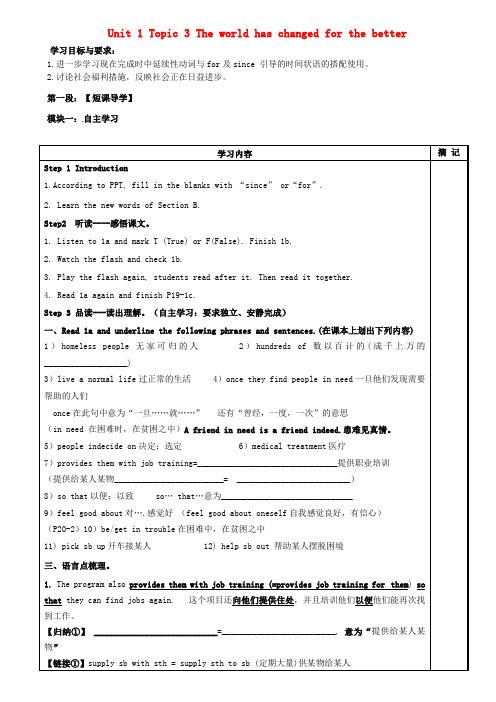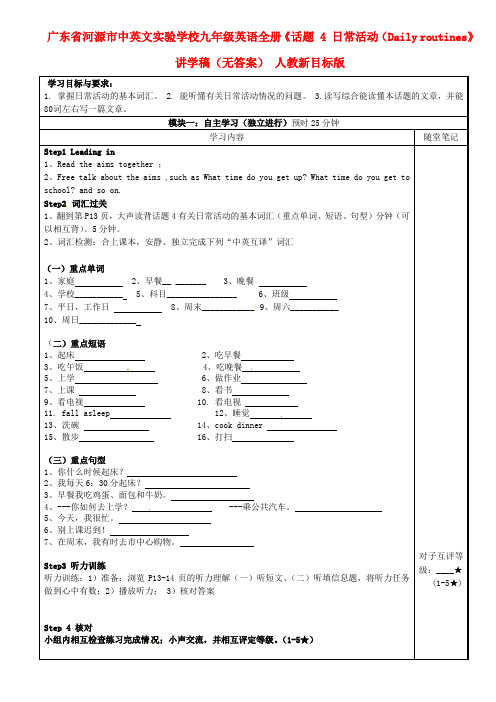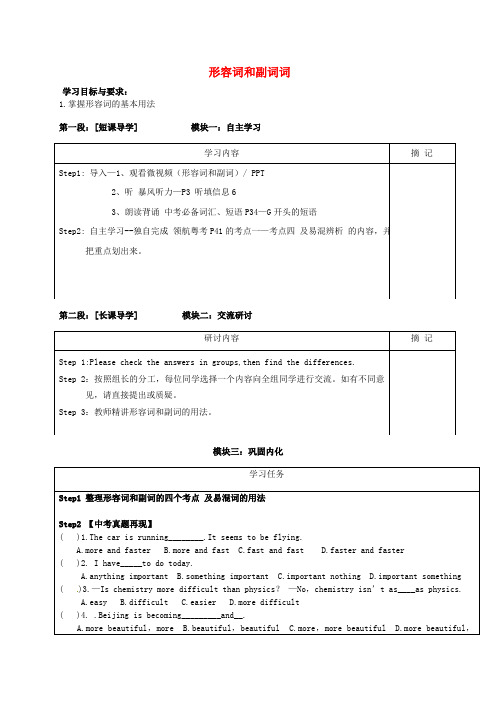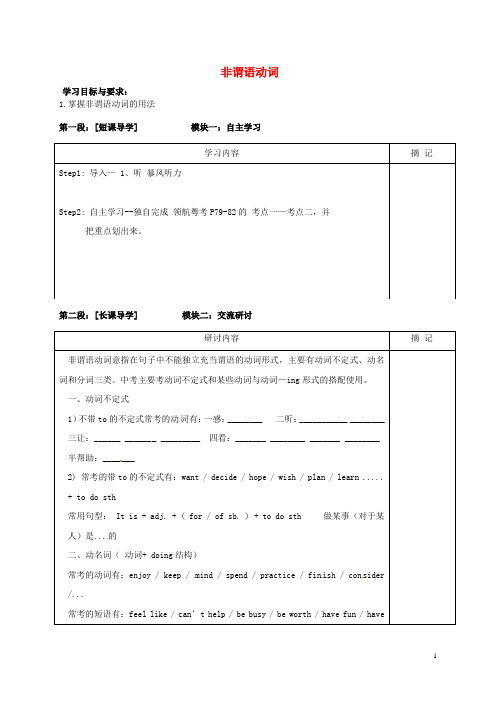广东省河源市中国教育学会中英文实验学校届中考英语 九级 Units -4词汇复习导学案(无答案)解析
- 格式:doc
- 大小:63.00 KB
- 文档页数:3

九年级英语人教版unit4知识点Unit 4 Knowledge Points in Grade Nine English of People's Education PressIntroduction:In the Grade Nine English textbook of People's Education Press, Unit 4 covers various knowledge points that are essential for students to improve their English skills. This article will explore and discuss these knowledge points in depth, allowing students to have a clearer understanding of the unit and enhance their language proficiency.1. Vocabulary:Vocabulary plays a crucial role in language learning, enabling students to express themselves accurately and fluently. In Unit 4, students will come across a wide range of vocabulary related to different topics, such as travel, sports, hobbies, and emotions. It is essential for students to familiarize themselves with these words, understand their meanings, and learn how to use them appropriately in various contexts.2. Phrases and Idioms:Besides vocabulary, the unit also introduces various phrases and idioms that can enrich students' language and make their speech more native-like. For example, expressions like "go for a walk," "hit the gym," or "break a leg" are commonly used in English and can add color to students' conversations. By incorporating these phrases and idioms into their language practice, students can enhance their speaking and writing skills effectively.3. Grammar:Grammar forms the backbone of any language, providing the structure and rules necessary for effective communication. In Unit 4, students will review and learn several grammar concepts, including verb tenses, modal verbs, and conditionals. Understanding these grammar rules is essential for constructing accurate sentences and conveying the intended meaning. Through consistent practice and application, students can master these grammar points and improve their overall language proficiency.4. Reading Comprehension:Unit 4 includes various reading passages that aim to improve students' reading comprehension skills. These passages cover a range of topics, from environmental issues to personal experiences, allowing students to expand their knowledge while developing their readingabilities. By reading extensively and actively engaging with the texts, students can improve their comprehension, vocabulary, and critical thinking skills simultaneously.5. Listening Skills:Effective listening is a fundamental skill in language learning. Unit 4 provides numerous listening exercises that enable students to sharpen their listening skills and enhance their ability to understand spoken English. These exercises may feature dialogues, interviews, or monologues, covering different accents, speeds, and levels of complexity. Through regular practice, students can gradually improve their listening comprehension and become more proficient in understanding spoken English.6. Writing Practice:In Unit 4, students have the opportunity to practice various types of writing, such as descriptive, narrative, and persuasive writing. These writing tasks encourage students to express their ideas, thoughts, and experiences in a coherent and organized manner. By paying attention to the appropriate use of vocabulary, grammar, and sentence structure, students can develop their writing skills, foster creativity, and effectively communicate their thoughts on paper.Conclusion:Unit 4 of Grade Nine English in the People's Education Press textbook covers vital knowledge points necessary for students to enhance their language skills. By thoroughly understanding and practicing vocabulary, phrases, grammar, reading comprehension, listening, and writing, students can become more confident and proficient users of the English language. Regular and consistent practice, both in and outside the classroom, is key to achieving fluency and success in English communication.。

Unit 1 Topic 3 The world has changed for the better学习目标与要求:1.进一步学习现在完成时中延续性动词与for及since 引导的时间状语的搭配使用。
2.讨论社会福利措施,反映社会正在日益进步。
第一段:【短课导学】模块一:自主学习学习内容摘记Step 1 Introduction1.According to PPT, fill in the blanks with “since” or“for”.2. Learn the new words of Section B.Step2 听读----感悟课文。
1. Listen to 1a and mark T (True) or F(False). Finish 1b.2. Watch the flash and check 1b.3. Play the flash again, students read after it. Then read it together.4. Read 1a again and finish P19-1c.Step 3 品读---读出理解。
(自主学习:要求独立、安静完成)一、Read 1a and underline the following phrases and sentences.(在课本上划出下列内容)1)homeless people无家可归的人2)hundreds of 数以百计的(成千上万的___________________)3)live a normal life过正常的生活 4)once they find people in need一旦他们发现需要帮助的人们once在此句中意为“一旦……就……”还有“曾经,一度,一次”的意思(in need 在困难时,在贫困之中)A friend in need is a friend indeed.患难见真情。

广东省河源市中英文实验学校九年级英语全册《话题 4 日常活动(Daily routines》讲学稿(无答案)人教新目标版学习目标与要求:1. 掌握日常活动的基本词汇。
2. 能听懂有关日常活动情况的问题。
3.读写综合能读懂本话题的文章,并能80词左右写一篇文章。
模块一:自主学习(独立进行)预时25分钟学习内容随堂笔记Step1 Leading in1、Read the aims together ;2、Free talk about the aims ,such as What time do you get up? What time do you get toschool? and so on.Step2词汇过关1、翻到第P13页,大声读背话题4有关日常活动的基本词汇(重点单词、短语、句型)分钟(可以相互背)。
5分钟。
2、词汇检测:合上课本,安静、独立完成下列“中英互译”词汇(一)重点单词1、家庭2、早餐__ _______3、晚餐4、学校___________5、科目________________6、班级7、平日,工作日 8、周末____________ 9、周六___________10、周日_____________(二)重点短语1、起床2、吃早餐3、吃午饭4、吃晚餐5、上学6、做作业7、上课 8、看书9、看电视 10. 看电视11. fall asleep 12、睡觉13、洗碗 14、cook dinner15、散步 16、打扫(三)重点句型1、你什么时候起床?2、我每天6:30分起床?3、早餐我吃鸡蛋、面包和牛奶。
4、---你如何去上学? ---乘公共汽车。
5、今天,我很忙。
6、别上课迟到!7、在周末,我有时去市中心购物。
Step3 听力训练听力训练:1)准备:浏览P13-14页的听力理解(一)听短文、(二)听填信息题,将听力任务做到心中有数;2)播放听力; 3)核对答案Step 4 核对小组内相互检查练习完成情况;小声交流,并相互评定等级。

九年级英语知识点总结unit4 Unit 4 Summary of 9th Grade EnglishIn the 9th grade English curriculum, Unit 4 covers a wide range of relevant and interesting topics. This unit encompasses various aspects of vocabulary, grammar, reading, and writing. Through the study of this unit, students can enhance their English language skills and expand their knowledge in different areas.One of the key areas of focus in Unit 4 is vocabulary. Students learn new words related to technology and its impact on society. They explore terms like "digital divide," "artificial intelligence," "cyberbullying," and "virtual reality." Understanding these terms is crucial in an increasingly digital world. By expanding their vocabulary, students can communicate effectively and develop a deeper understanding of the world around them.Grammar is another important component of Unit 4. In this unit, students delve into the proper usage of verb tenses, including present continuous and present perfect. They learn to differentiate between these tenses and understand when to use each one accurately. Additionally, students explore the concept of reported speech, allowing them to effectively convey information or someone else's words.Mastering grammar rules such as these is essential for clear and coherent communication in English.The unit also emphasizes reading comprehension. Students are exposed to a variety of texts, such as news articles and opinion pieces, which allow them to develop critical thinking skills. They learn to identify main ideas, infer meanings, and make connections between different pieces of information. These reading exercises cultivate students' analytical skills, enabling them to interpret texts accurately and form well-grounded opinions.Unit 4 also includes exercises that reinforce writing skills. Students are encouraged to express their thoughts and opinions through essay writing. They learn how to structure an essay, develop a thesis statement, and support their arguments with evidence and examples. Additionally, they practice writing formal letters and emails, which are essential forms of communication in both academic and professional settings. These writing activities foster clarity, coherence, and creativity in students' written expression.Moreover, cultural understanding is a vital aspect of Unit 4. Students are exposed to different cultures and their customs through various readings and discussions. They learn about multiculturalism,cultural diversity, and the importance of respecting others' beliefs and traditions. This cultivates global awareness in students and encourages them to embrace diversity in their own lives.In conclusion, Unit 4 of the 9th grade English curriculum offers a comprehensive and engaging learning experience. By mastering vocabulary, grammar, reading comprehension, writing skills, and cultural understanding, students acquire the necessary tools to navigate the English language effectively. This unit not only enhances their language proficiency but also broadens their perspective on the world. As students progress through this unit, they develop valuable skills that will serve them well in their academic, personal, and professional lives.。

形容词和副词词学习目标与要求:1.掌握形容词的基本用法第一段:[短课导学] 模块一:自主学习学习内容摘记Step1: 导入—1、观看微视频(形容词和副词)/ PPT2、听暴风听力—P3 听填信息63、朗读背诵中考必备词汇、短语P34—G开头的短语Step2: 自主学习--独自完成领航粤考P41的考点一—考点四及易混辨析的内容,并把重点划出来。
第二段:[长课导学] 模块二:交流研讨研讨内容摘记Step 1:Please check the answers in groups,then find the differences.Step 2:按照组长的分工,每位同学选择一个内容向全组同学进行交流。
如有不同意见,请直接提出或质疑。
Step 3:教师精讲形容词和副词的用法。
模块三:巩固内化学习任务Step1 整理形容词和副词的四个考点及易混词的用法Step2 【中考真题再现】( )1.The car is running________.It seems to be flying.A.more and fasterB.more and fastC.fast and fastD.faster and faster( )2. I have_____to do today.A.anything importantB.something importantC.important nothingD.important something ( )3.—Is chemistry more difficult than physics?—No,chemistry isn’t as____as physics.A.easyB.difficultC.easierD.more difficult( )4. .Beijing is becoming_________and__.A.more beautiful,moreB.beautiful,beautifulC.more,more beautifulD.more beautiful,more beautiful( )5.______ children there are in a family,_____their life will be.A.The less,the betterB.The fewer,the betterC.Fewer,richerD.More,poorer( )6. The experiment was ________ easier than we had expected.A.moreB.much moreC.muchD.more much( )7.Oct 15th was one of ________ days in 2020.The Shenzhou-V was sent up successfully.A.excitingB.mor e excitingC.the most excitingD.much exciting( )8.I feel even_____now.A.badB.wellC.worseD.worst( )9.He is taller than_________in his class.A.any boyB.anyC.any other boyD.some other boys( )10.English is as _____ as Chinese.You should learn it well.A.importantB.more importantC.the most importantD.much more important( )11.Music is not so useful as science.It’s ________ useful than science.A.fewerB.less C more D.a lot( )12.Do you have ____ to tell us?A.something newB.new somethingC.anything newD.new anything( )13.Three years _______,he become a driver. te ter tely D.more lately ( )14.He is ______ enough to carry the heavy box.A.strongerB.much strongerC.strongD.the strongest( )15.I bought _____ exercise-books with____money.A.a few,a fewB.a few,a littleC.a little,a fewD.a little,a little( )16.The box is _____ heavy for the girl____carry.A.too,toB.to,tooC.so,thatD. enough , to( )17.--Do you think the fish tastes_______?--She cooked it______,Ithink.A good,goodB well,goodC well,wellD good,well( )18.She played the piano_____than we h ad thought.A.successfulB.successfullyC.more successfulD.more successfully( )19.—I s the physics problem_________? —Yes,I can work it out _________.A.easy,easilyB.easy,easyC.easily,easyD.easily,easily( )20.Her mother was out.She stayed at home______,but she didn't feel _________.A.alone,lonelyB.lonely aloneC.alone,lonelyD.lonely,alone( )21.—Which is_________ season in Beijing?—I think it's autumn.A.goodB.betterC.bestD.the best( )22.Remember not to speak ____ when we are in the reading room. A.fast .slowly C.politely D.loudly( )23.--- ______ has this food store been in business?--- Since 2001.A.How longB.How oftenC.How old w soon( )24.—What was the weather like yesterday?—It was terrible. It rained so ___ that people could ____ go out.A.hardly…hardB.hardly…hardlyC.hard…hardlyD.hard…hard( )25.What a ____ cough!You seem_____ill.A.terrible,terriblyB.terribly,terribleC.terribl e,terribleD.terribly,terribly( )26.She was very happy. She ran_____of all the runners.模块四:当堂训练完成领航粤考P48-49-真题集训。

非谓语动词学习目标与要求:1.掌握非谓语动词的用法第一段:[短课导学] 模块一:自主学习学习内容摘记Step1: 导入— 1、听暴风听力Step2: 自主学习--独自完成领航粤考P79-82的考点一—考点二,并把重点划出来。
第二段:[长课导学] 模块二:交流研讨研讨内容摘记非谓语动词意指在句子中不能独立充当谓语的动词形式,主要有动词不定式、动名词和分词三类。
中考主要考动词不定式和某些动词与动词—ing形式的搭配使用。
一、动词不定式1)不带to的不定式常考的动词有:一感:________ 二听:___________ ________三让:______ _______ _________ 四看:_______ ________ _______ ________半帮助:_______2) 常考的带to的不定式有:want / decide / hope / wish / plan / learn .....+ to do sth常用句型: It is + adj. + ( for / of sb. ) + to do sth 做某事(对于某人)是...的二、动名词(动词+ doing结构)常考的动词有:enjoy / keep / mind / spend / practice / fin ish / con sider/...常考的短语有:feel like / can’t help / be busy / be worth / have fun / havetrouble / be used to / look forward to / pay attention to / make a contribution to ... + doing【注意】有部分动词可接to do 也可接ing形式:like / hate / st op / remember / forget/ try ....模块三:巩固内化学习任务Step1 整理非谓语动词的两个考点。
新课标九年级英语unit4英语知识点Unit 4: English Language SkillsIntroduction:In the ninth grade, students are introduced to a variety of English language skills that are essential for effective communication. This unit focuses on important aspects such as grammar, vocabulary, comprehension, and writing skills. Developing a strong foundation in these areas will not only enhance students' language proficiency but also empower them to express their thoughts and ideas confidently.Grammar:Grammar forms the backbone of any language, and English is no exception. Understanding the rules and structures of English grammar is crucial for forming correct sentences and communicating effectively. In Unit 4, students explore different tenses, such as the simple present, simple past, and future tenses. They learn how to use these tenses appropriately in sentences, allowing for accurate communication of actions and events in the past, present, and future.Vocabulary:Expanding one's vocabulary is vital for improving language skills. In this unit, students engage in various vocabulary-building exercises that encompass both everyday and academic words. They learn synonyms, antonyms, and phrases that can be used to express particular ideas or feelings. Additionally, students are encouraged to incorporate new words into their writing and speaking, promoting a deeper understanding and a wider range of expression.Reading Comprehension:Comprehension is the ability to understand and interpret written texts accurately. Unit 4 focuses on developing reading comprehension skills through a range of texts, including fiction, non-fiction, and informative articles. Students learn how to identify main ideas, infer meaning from context, and make connections between different parts of a text. Building these skills not only helps students become more critical readers but also enhances their overall language proficiency.Writing:Effective writing skills are crucial for expressing ideas and opinions clearly. In this unit, students are introduced to various types of writing, such as narratives, descriptive essays, and persuasive pieces. They learn how to structure their writing, organize their thoughts, and develop coherent paragraphs. Additionally, students explore different writingtechniques, such as using vivid imagery and employing persuasive language, to make their writing more engaging and persuasive.Listening and Speaking:Listening and speaking skills play a significant role in effective communication. Unit 4 encompasses activities that focus on enhancing students' listening and speaking abilities. Students engage in listening exercises to improve comprehension, develop note-taking skills, and practice following instructions accurately. Furthermore, they participate in discussions, debates, and presentations to refine their speaking skills and express their thoughts confidently in English.Conclusion:Unit 4 of the ninth-grade English curriculum provides students with a comprehensive understanding of essential language skills. By mastering grammar, expanding vocabulary, improving reading comprehension, developing writing skills, and enhancing listening and speaking abilities, students will be equipped to express themselves fluently and accurately in English. These fundamental skills will not only boost their performance in future English courses but also prepare them for various academic and professional endeavors where effective communication is paramount.。
English is widely spoken throughout the world学习目标:1. 掌握本课的重点词汇和短语:cartoon, character, widely, foreigner, from now on2. 通过谈论去参观迪尼斯乐园来引入English is widely spoken throughout the world并初步学习一般现在时态的被动语态。
3. 知道英语作为一种国际语言,在世界文化领域占有重要地位。
第一段:【短课导学】模块一:自主学习学习内容摘记Step1. IntroductionShow the pictures of Mickey Mouse and Donald Duck.(PPT) Then ask:Do you know the storyof Mickey Mouse?Step 2. Understanding and listening1. P56-3,listen to the passage and mark T or F. Finish 3.2. P55-1b,listen to 1a and choose the correct answers. Finish 1b.Step3 听读----感悟课文。
1.Watch the flash of 1a and check 1b。
2.Play the flash of 1a again, students read after it.3.Ss read 1a again and fill in the blanks. Finish 1c.Step4 品读----读出理解。
(自主学习:要求独立、安静完成)一、Read P55-1a and underline the following phrases and sentences.(在课本上划出下列内容)1) have a look 看一看2) You can stick it on the wall.你可以把它贴到墙上。
What can we do at home to protect the environment学习目标:1. 掌握本课的重点词汇和短语,technology, renewable, disadvantage, require, German, wheel, guide,deep, run out, source, worldwide, produce…from…, not only…but also…, too…to…2. 了解世界各地的人们如何开发和利用环境友好型和资源节约型的新能源,同时了解这些新能源的利用方式所存在的不足之处。
并继续学习并列句。
3. 理解文中出现的被动语态。
第一段:【短课导学】模块一:自主学习学习内容摘记Step1. Introduction1.Reviewing. How can we become a greener person? (PPT)2.Let Ss look at the pictures.(PPT) Let them guess wha t they are?Step 2. 初读—感悟课文一、Read P21-1a and underline the following phrases and sentences.(在课本上划出下列内容,并归纳短语及结构)1. Some countries use nuclear energy to produce power. 一些国家使用核能生产能源。
(“使用…做某事”_______________________________)2. To solve the energy problem, people all over the world are looking for new waysto produce power.为了解决能源问题,世界各地的人们都在寻找生产能源的新方法。
3. 中国是世界上最先使用沼气技术的国家之一。
Unit1 Topic 2 The population in developing countres is growing faster学习目标:复习Unit1- Topic2的重点词汇、句型、语法。
模块一:自主学习学习内容摘记一、重点单词:1、还,仍2、很可能3、电影院4、人口5、增加6、实现、达到7、俄罗斯 8、社会的9、自然的 10、更差的11、政府 12、提供13、当地的 14、首都15、巨大的二、重点短语1、迷路 /2、call sb. 打电话给某人3、因为4、采取措施做某事5、作为...而著名6、因...而著名7、在某方面起明显的作用(work)8、幸亏9、到目前为止10、实施独生子女政策11、对....小心(careful)三、重点句型1、I have you, but you weren’t in. 我刚刚打电话给你,但你不在家。
2、---I really hate to a place that.我真讨厌去那样一个地方--- 。
我也是。
3、What a population! 这么多人口!4、And it is 80 million every year. 世界人口每年增加8000万。
5、It shows that the population in countries is than indeveloped countries. 它标明发展中国家的人口比发达国家的人口更多。
四、语法1、现在完成时的结构:2、现在完成时常与(已经),(还,仍),(刚刚),(曾经),(从来没有)等连用。
模块二:当堂训练老师的话:复杂的事情简单做,简单的事情认真做,认真做的事情重复做,重复做的事情创造性做!一时专一事,做最好的自己,你一定成功!单项选择( )1.—When did the Greens come to China?—They_____ China for seven years.A.have come toB.have been toC.have come inD.have been in( )2.—Have you cleaned your room_____?—Yes, I’ve_____clea ned it.A.already, alreadyB.yet, yetC.already, yetD.yet, already( )3. —What are you reading about?—It’s about the one-child policy. It says that the policy has_____controlling the population in China.A.been good atB.taken good care ofC.worked well inD.got on well with( )4.—_____ you _____ your homework yet? —Yes, I _____ it ten minutes ago.A.Did, do, finishedB.Have, done, have finishedC.Have, done, finishedD.Will, do, finish( )5.Xi’an is a city with many places of interest and _____ tourists come here every year.A.thousand ofB.thousandC.thousandsD.thousands of( )6.This is the most beautiful park I have _____ visited.A.everB.stillC.neverD.been( )7.—Can you write the number eighty-five thousand, six hundred and twenty-six?—Yes, it is _____.A.85,626B.856,620C.58,662D.58,626( )8.Now most families have only one child _____ our country’s one-child policy.A.soB.becauseC.because forD.because of( )9.—David has made great progress recently.—_____, and _____.A.So he has, so you haveB.So he has, so have youC.So has he, so have youD.So has he, so you have( )10.—Which country has the_____population in the world?—China.A.smallestB.mostrgestrge( )pared with last year, our pay _____ ¥500 every month.A.has increased byB.has increasedC.increased byD.increased to( )12.—It seems _____ you like to work with children.—Yes, they are so lovely.A.thatB.whatC.toD.as( )13.In our class _____ of the students _____ girls.A.third fifths, isB.third fifth, areC.three fifth, isD.three fifths, are ( )14. I used to_____my dream. But now I get used to_____doing everything. I think I’ll be successful one day.A.give up, keepingB. giving up, keepingC.giving up, keepD. give up, keep( )15.—In the old days, most teenagers had to work for the landlord (地主) in the field to help _____ t heir families, because their families couldn’t _____ education for them.—What a pity!A.support, supplyB.afford, supportC.support, affordD.afford, give2。